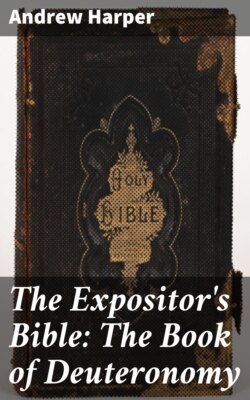Читать книгу The Expositor's Bible: The Book of Deuteronomy - Andrew Harper - Страница 6
На сайте Литреса книга снята с продажи.
ОглавлениеThese then are the conclusions regarding Deuteronomy on which the exposition offered here will rest. They have been reached after a careful consideration of the evidence on both sides, and are stated here not altogether without regret. For, as Robertson Smith has well said,[21] "to the ordinary believer the Bible is precious as the practical rule of faith and life in which God still speaks directly to his heart. No criticism can be otherwise than hurtful to faith if it shakes the confidence with which the simple Christian turns to his Bible, assured that he can receive every message which it brings to his soul as a message from God Himself." Now, though it can be demonstrated that the view of Scripture which permits of such conclusions as those stated above is quite compatible with this believing confidence, there can be little doubt that Christian people will for a time find great difficulty in accepting this assurance. The transition from the old view of inspiration, so complete, comprehensible, and effective as it is, to the newer and less definite doctrine, cannot fail to be trying, and the introduction of it here cannot but be a disturbing influence which it would have been greatly preferable to avoid.
It is not to be wondered at, therefore, that to the minds of the working ministry and of their earnest fellow-labourers, who come into constant contact with the actual needs of men, the change should be unwelcome. But it cannot now, in my judgment, be avoided. Even the best and most scholarly work of those who still hold the traditional view does not convince. Rather it is their writings, more even than those on the modern side, which make it clear that the traditional view can no longer be held. These writers admit the facts upon which their opponents' case rests, and then explain them all away, harmonising everything by a crowd of hypotheses, often scholarly, generally acute, but almost always such as can be accepted only if we know beforehand that the view they support is true. But far too many hypotheses are needed. Each case has to be set right by a special effort of the imagination; while the new view has this great advantage, that it makes room for all the facts, by a hypothesis, suggested not by one difficulty, but by almost all the discrepancies and difficulties which are encountered. And, after all, this view does not move men away from the central truth of inspiration, even as it was conceived by the last generation. Apart from any care for averting errors in detail which can be ascribed to Divine wisdom according to the old view or the new, the central thing in both surely is the revelation of God Himself. It was always God that was held to be revealed, and this the advocates of the newer view insist upon most strenuously. They hold that chosen men, the wisest, best, most truthful of their respective generations, those who travailed most in thought, received exceptional impressions of the Divine nature. They saw God, and their whole being bore the impress henceforth of this illumination. In every word and act the light they had received found expression for itself. They did not receive this revelation in mere propositions about God, which had to be carefully repeated with minute verbal accuracy. They saw, and their natures were in their degree uplifted, changed, and harmonised with the Divine. They could no more be false in speaking of what they had thus experienced, than a sincere and tender nature can be false in speech or thought about death, when it once has found its love frustrated and overborne by that dread messenger of God. The impression in both cases is true as it is final, and it will triumphantly convey itself to others with substantial and effective truth, whatever the man's knowledge or ignorance otherwise may be. When a man has received an impression, or a sight of God which has shaken his very soul, will it be lost in its essential parts because in the speech in which he utters it he shows ignorance of science, or accepts as simply true the historic knowledge of his day? The thing is impossible. The light that is within him must shine out, even though the medium through which it shines be here and there blackened by imperfection. In the fundamental point, therefore, the old school of critics and the new are entirely at one. On the basis of this essential harmony it should be possible for each to speak to the other for edification. This is what has been attempted here; and if those who hold by the Mosaic authorship of Deuteronomy will tolerate the opposite view, they will find that in dealing with the Scriptures as a revelation of God, and as an infallible guide in all that concerns religious and moral truth, there is no difference. To make the sacred word living and powerful as an instrument of spiritual regeneration is our common effort; and our common hope must be that, if in anything we have been led into error, the mistake may be discovered and removed, before it has wrought evil in the Church of God.
